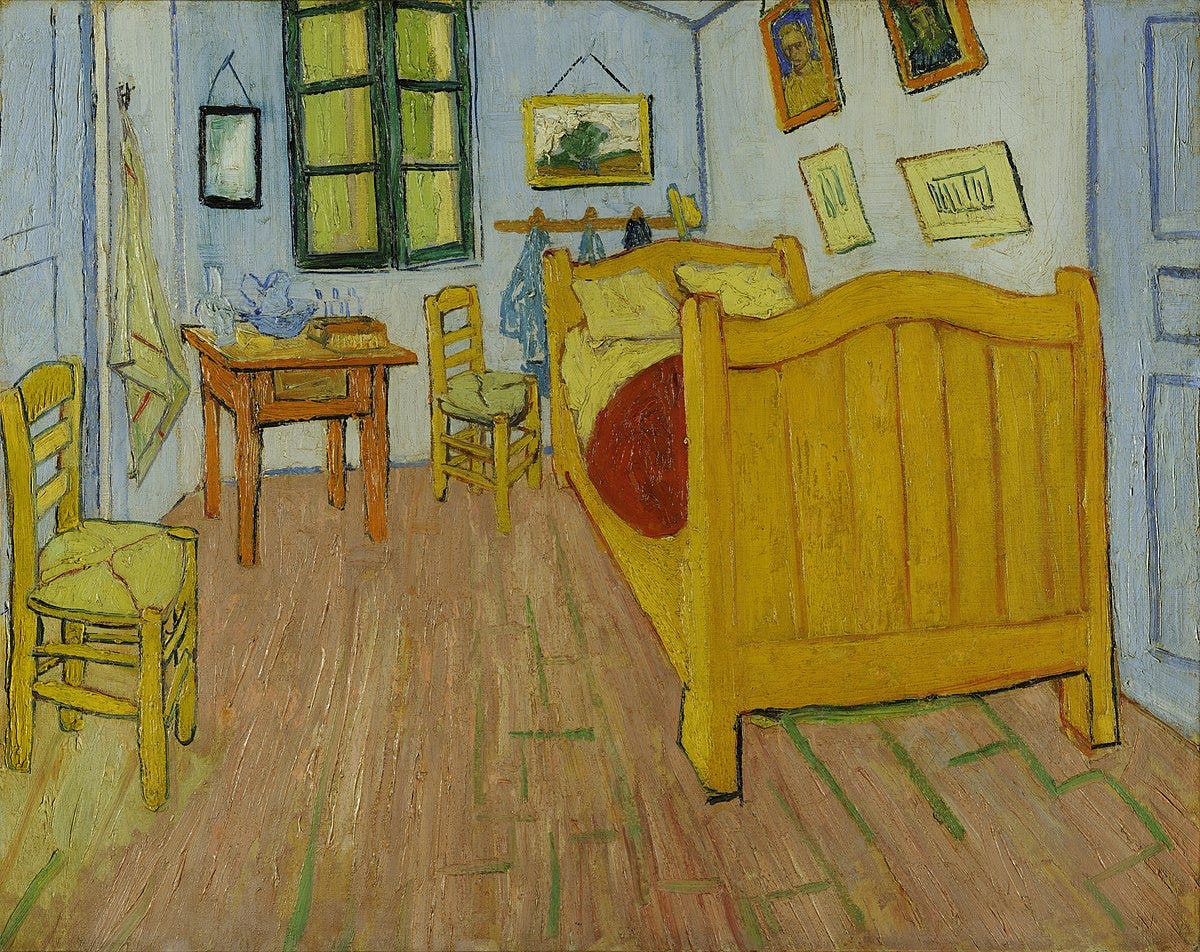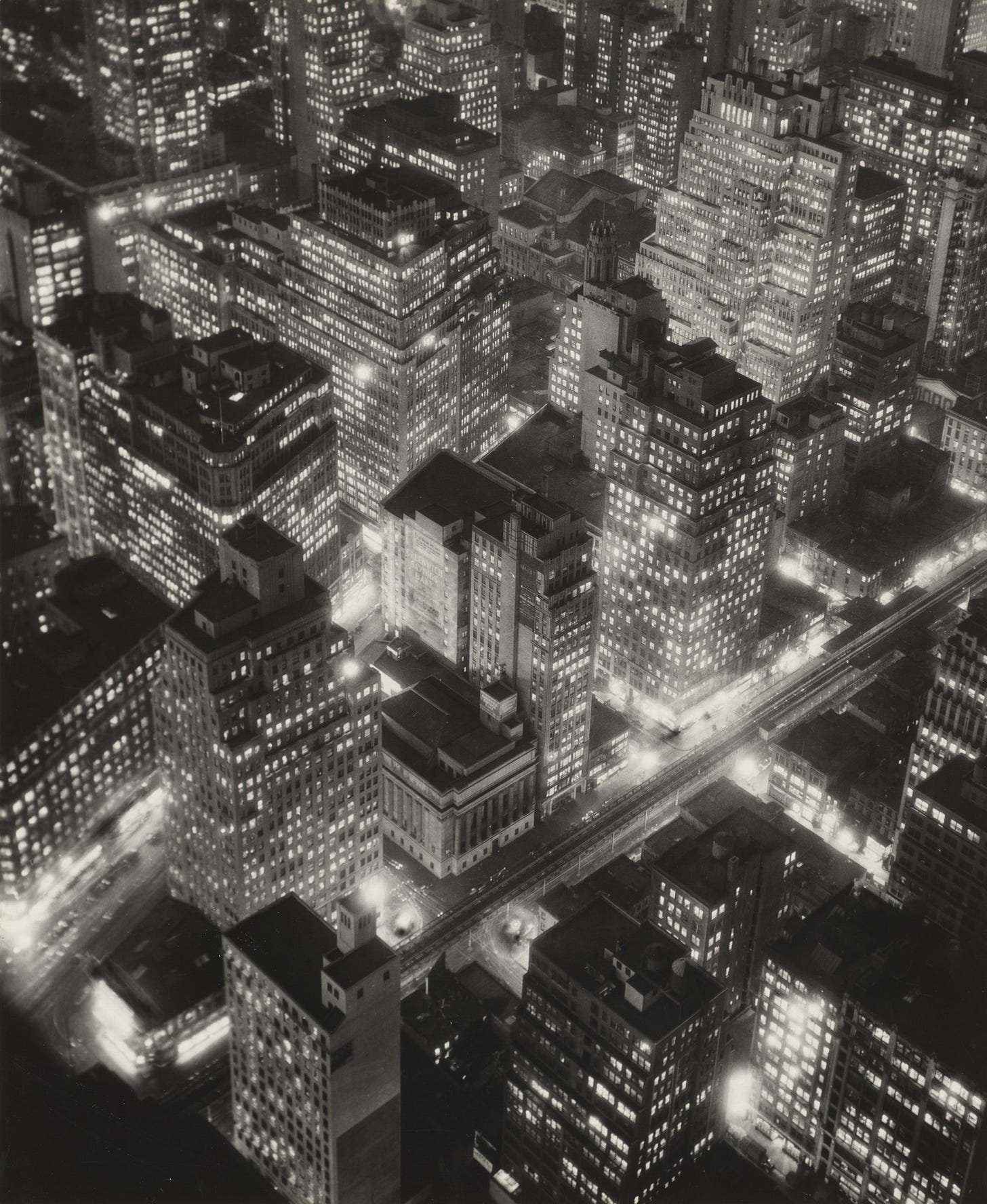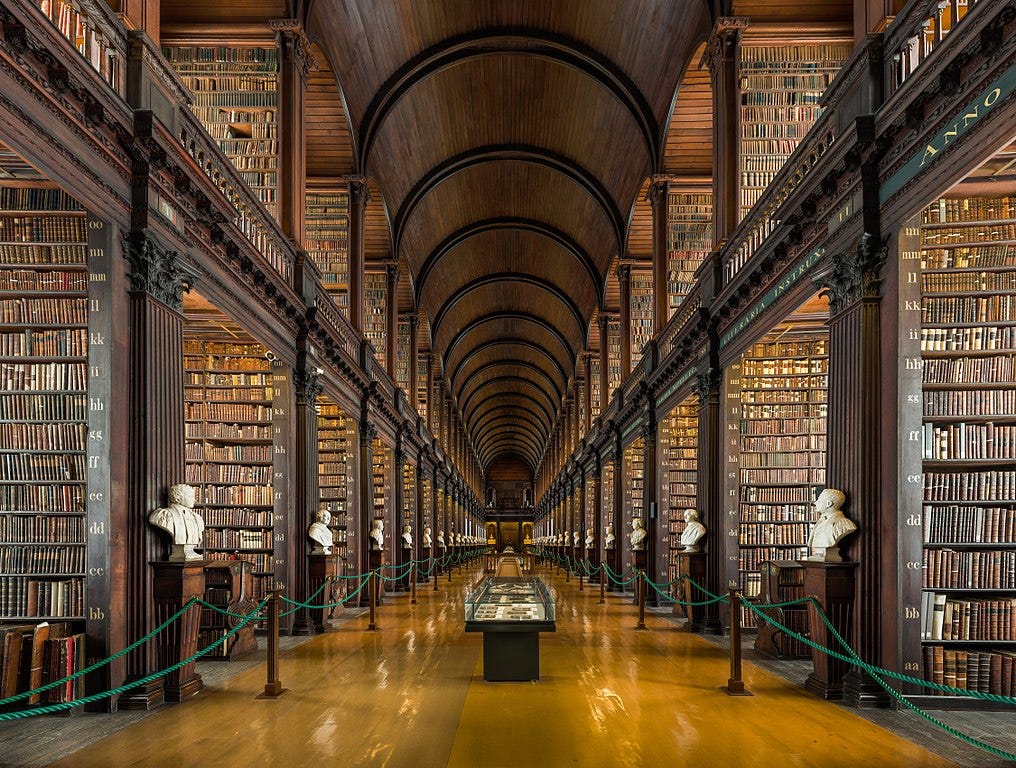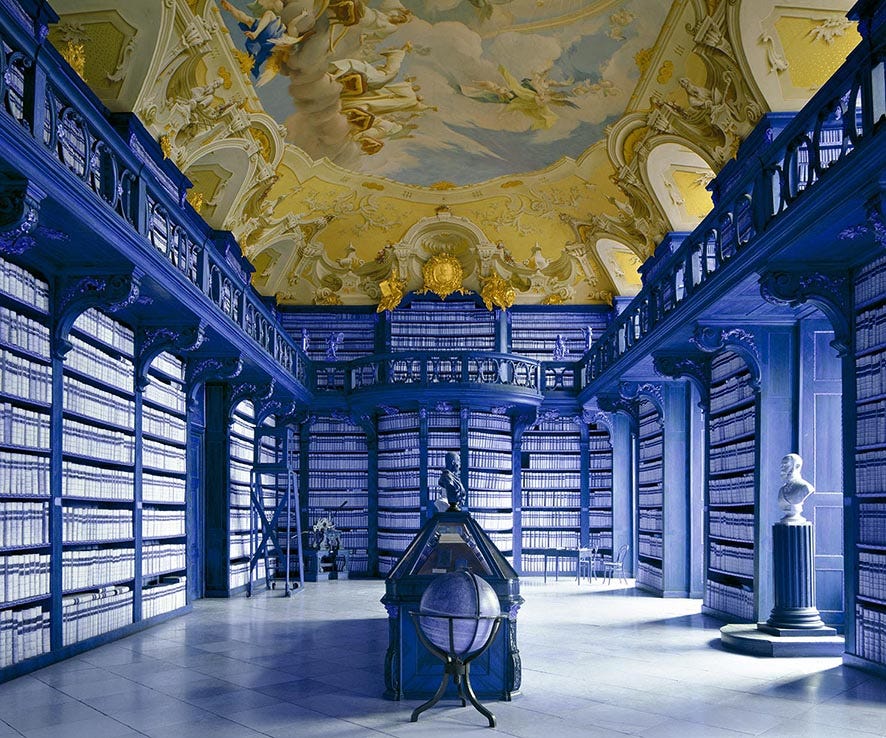⌾Curio #45 - Joan Didion, Beautiful Libraries & Hot Since 82
Dear reader,
It’s been a while! In fact, it’s been so long you may have forgotten what this is. A quick refresher: I’m a Nigerian prince seeking immediate financial assistance. I would be most grateful if you could transfer USD$100,000 into a savings account regulated by the Central Bank of Lagos. For account details please respond to this email at your earliest convenience.
Just kidding — I’m no Nigerian prince, just Oli Duchesne, writer of haikus, admirer of Indian mud wrestling and creator of Curio, the newsletter for curious minds seeking an escape from the noise of the news cycle. However, if you do consider this spam, you can always unsubscribe with one click.
I’m writing to you from a hotel room in Sydney, nine days into a fourteen day mandatory quarantine. I haven’t been able to leave the room and there is no window to open. I’ve forgotten what fresh air smells like.

Vincent van Gogh - Bedroom in Arles (1888)
—
I left New York early last week and arrived here via long layovers in LA and Auckland (Air New Zealand were the only airline not costing a king’s ransom). We were taken from the flight into an area where we were examined by doctors and had our temperature checked and then herded onto a series of buses by members of the Australian Army. It was grey and drizzling.
Upon arriving outside the hotel, a police officer hopped on, greeted us and read the obligatory government information. He was a jovial character, adding jokes (“No virtual raves in the room, okay? I’m looking at you,” while pointing at an elderly Asian woman in the second row) and cracking one-liners at every opportunity (“Cheer up everybody, it could be worse. You could be staying in a complete shithole!”). Stupefied with tiredness, we weren’t a great audience and just stared blankly back.
We were ordered off the bus at intervals and taken into the hotel to fill out various forms. I was then escorted to my room by a member of the Army, a young guy who looked about my age. It vaguely registered that this would be my last person to person conversation in two weeks but I was too exhausted to say anything interesting or original. All I could muster was, “So, have you been here long?”
“Six weeks.”
I nodded mindlessly.
“Everyday is a workout,” he said, lifting my bags out of the elevator. “I haven’t needed to go to the gym since I got here.”
We arrived at a door on the eleventh floor.
“This is your home for the next fourteen days,” he said as we entered the room. “All the information about your stay is in a packet on the desk. You don’t get a key as you can’t leave. Any questions at all, just call guest services. Good luck.”
He shut the door.
Joan Didion On Leaving New York
“I was in love with New York. I do not mean ‘love’ in any colloquial way, I mean that I was in love with the city, the way you love the first person who ever touches you and you never love anyone quite that way again”
In Joan Didion’s classic collection of essays, Slouching Towards Bethlehem (1968), she offers a series of impressions, critiques and insights on various aspects of America during the turbulent decade of the sixties. The title essay is perhaps the most influential and aimed to shatter the idealistic mythology surrounding the counter-culture hippy movement in San Francisco, where she leaves the reader with the harrowing image of a toddler staggering around a filthy apartment without any sign of his parents, high on LSD.

Didion’s book, Slouching Towards Bethlehem, takes its title from the poem "The Second Coming" by W. B. Yeats
—
One of the other iconic pieces in the collection is an essay Didion wrote when she left New York, titled “Goodbye To All That”. I was reminded of it on my long journey back home to Australia.
Goodbye To All That
Excerpts from the famous essay are below:
When I first saw New York I was twenty, and it was summertime, and I got off a DC-7 at the old Idlewild temporary terminal in a new dress which had seemed very smart in Sacramento but seemed less smart already, even in the old Idlewild temporary terminal, and the warm air smelled of mildew and some instinct, programmed by all the movies I had ever seen and all the songs I had ever read about New York, informed me that it would never be quite the same again. In fact it never was.
…
All I could do during those years was talk long-distance to the boy I already knew I would never marry in the spring. I would stay in New York, I told him, just six months, and I could see the Brooklyn Bridge from my window. As it turned out the bridge was the Triborough, and I stayed eight years.

Berenice Abbott - Seventh Avenue looking south from 35th Street, Manhattan (1935)
—
Part of what I want to tell you is what it is like to be young in New York, how six months can become eight years with the deceptive ease of a film dissolve, for that is how those years appear to me now, in a long sequence of sentimental dissolves and old-fashioned trick shots—the Seagram Building fountains dissolve into snowflakes, I enter a revolving door at twenty and come out a good deal older, and on a different street. But most particularly I want to explain to you, and in the process perhaps to myself, why I no longer live in New York. It is often said that New York is a city for only the very rich and the very poor. It is less often said that New York is also, at least for those of us who came there from somewhere else, a city only for the very young.
…
You see I was in a curious position in New York: it never occurred to me that I was living a real life there. In my imagination I was always there for just another few months, just until Christmas or Easter or the first warm day in May.
…
I remember sitting in a lot of apartments with a slight headache about five o’clock in the morning. I had a friend who could not sleep, and he knew a few other people who had the same trouble, and we would watch the sky lighten and have a last drink with no ice and then go home in the early morning, when the streets were clean and wet (had it rained in the night? we never knew) and the few cruising taxis still had their headlights on and the only color was the red and green of traffic signals.

Berenice Abbott - New York at Night (1933)
—
Some years passed, but I still did not lose that sense of wonder about New York. I began to cherish the loneliness of it, the sense that at any given time no one need know where I was or what I was doing. I liked walking, from the East River over to the Hudson and back on brisk days, down around the Village on warm days.
…
And even that late in the game I still liked going to parties, all parties, bad parties, Saturday-afternoon parties given by recently married couples who lived in Stuyvesant Town, West Side parties given by unpublished or failed writers who served cheap red wine and talked about going to Guatalajara, Village parties where all the guests worked for advertising agencies and voted for Reform Democrats, press parties at Sardi’s, the worst kind of parties. You will have perceived by now that I was not one to profit by the experience of others, that it was a very long time indeed before I stopped believing in new faces and began to understand the lesson in that story, which was that it is distinctly possible to stay too long at the Fair.

Berenice Abbott - West Street (1938)
—
All I mean is that I was very young in New York, and that at some point the golden rhythm was broken, and I am not that young anymore. The last time I was in New York was in a cold January, and everyone was ill and tired. Many of the people I used to know there had moved to Dallas or had gone on Antabuse or had bought a farm in New Hampshire. We stayed ten days, and then we took an afternoon flight back to Los Angeles, and on the way home from the airport that night I could see the moon on the Pacific and smell jasmine all around and we both knew that there was no longer any point in keeping the apartment we still kept in New York. There were years when I called Los Angeles “the Coast,” but they seem a long time ago.
—
If you haven’t yet seen the Netflix documentary on Didion, you can check out the trailer here.
Beautiful Libraries
Is there anything more soothing than looking at photos of beautiful libraries? Below is a selection of some of the world’s most incredible collections of books. If you’ve been to any of these or have a suggestion for any others that are worth visiting please let me know!
Next week I’ll be sharing photos of some of the world’s most beautiful bookshops.

The Royal Portuguese Cabinet of Reading in Rio De Janeiro
—

Trinity College Library in Dublin
—

The Tianjin Binhai Library of Tianjin in China
—

The Girolamini Library in Naples
—

Palace Of Mafra Library, Mafra, Portugal
—

Wiblingen Monastery Library, Ulm, Germany
—

The Library of Seitenstetten, Austria
—
Hot Since 82
In 2010, Daley Padley, a lad from Yorkshire who grew up DJing at clubs in Leeds, was at an afterparty in Ibiza when the music cut out. He plugged his iPhone into the speakers and played some tracks, including a couple he had created himself. The response was so positive that the owner of a record label asked him to send through his songs and in 2011 Padley released a debut single under his new name, Hot Since 82. Success quickly followed and after a number of popular releases he founded his own house record label, Knee Deep In Sound. Padley now travels the world as an in-demand house DJ and has a summer residency at Pacha in Ibiza.
His recorded sets on Youtube (including this epic one on top of a fort in Dubrovnik) have been a regular feature of my lockdown. Europe 2021, anyone?
“Wonder is the beginning of wisdom.”
- Socrates
Curio is a newsletter for curious minds seeking an escape from the noise of the news cycle. It is put together by Oli Duchesne



